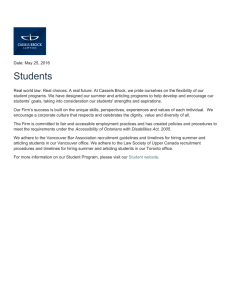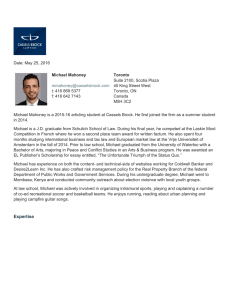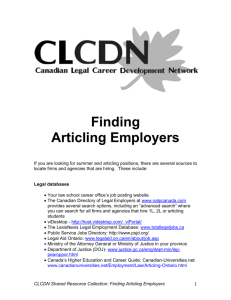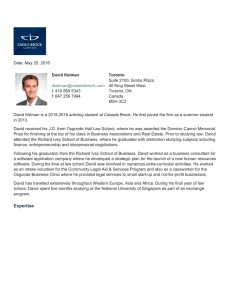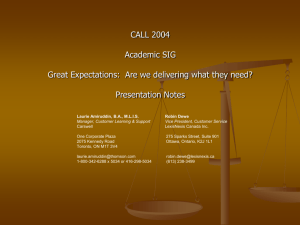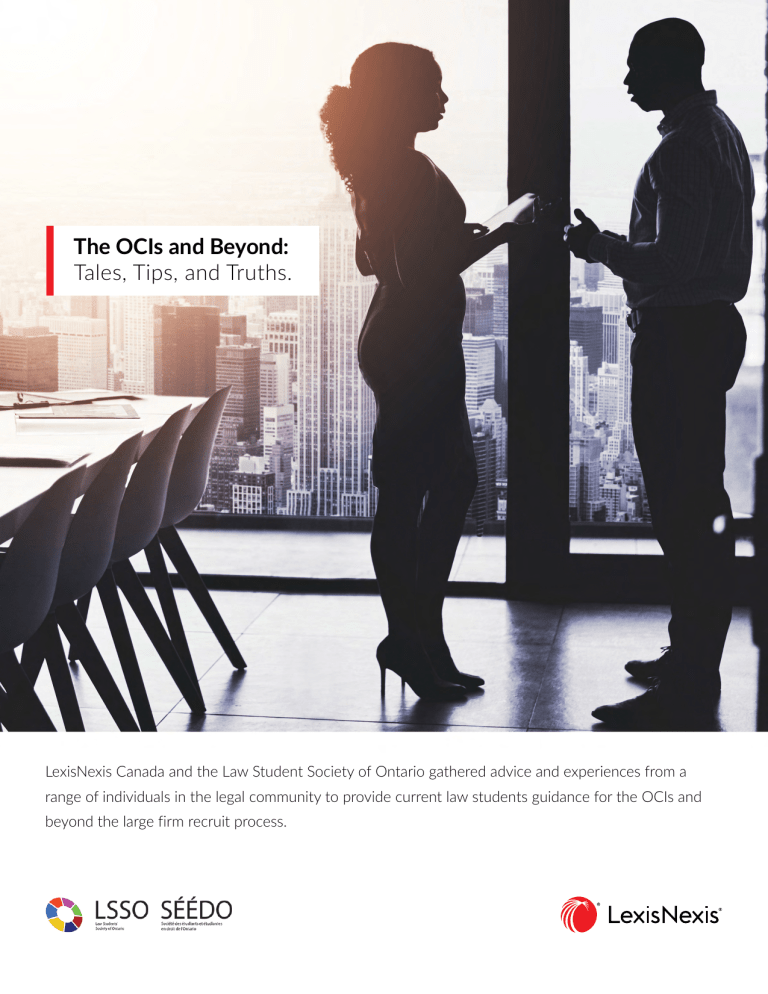
The OCIs and Beyond: Tales, Tips, and Truths. LexisNexis Canada and the Law Student Society of Ontario gathered advice and experiences from a range of individuals in the legal community to provide current law students guidance for the OCIs and beyond the large firm recruit process. THAN K YOU TO O UR CO N T RI B U TO RS . Click on any name below to skip directly to their comments if you’re interested in advice from a particular firm type or position. HANNAH J. ANONYMOUS CONTRIBUTOR Place of employment : Full-service firm, Goodmans LLP Place of employment : Boutique firm, Toronto/large city Current Position : 3L, University of Toronto Current Position : Articling student SHIRA K. DAVID Y. Place of employment : Boutique firm, Toronto/large city, Place of employment : Full-service firm, Toronto, Macdonald Kalfa Law Sager LLP Current Position : Partner Current Position : Summer law student OCEAN E. SHANIQWA T. Place of employment : Boutique firm, Toronto/large city Place of employment : Full-service firm, Stewart McKelvey Current Position : Incoming articling student LLP Current Position : Incoming articling clerk ANONYMOUS CONTRIBUTOR Place of employment : Government, provincial or municipal DENIS I. Current Position : Articling student Place of employment : Boutique firm, Toronto/large city, Nanua & Ioffe Lawyers Current Position : Managing Partner Hannah J. Place of employment: Full-service firm, Goodmans LLP Current Position: 3L, University of Toronto D ID YOU GO THROUGH TH E O CI P RO CE SS ? W H AT WAS YO U R EX P ER I ENC E? I went through the OCI process. I applied narrowly to large and mid-size corporate full-service firms only. I received two OCIs and one in firm. I made it to day three with my in-firm before being told shortly before the blackout period that they would not be in a position to offer me a job. HOW DI D YOU APPLY FO R A RTI CL I N G P L ACE M E NTS ? HOW D I D YO U END U P F IN D ING YOUR ARTI C L I N G P L ACE M E N T? I summered at the Ontario Ministry of Finance, which hired outside of the OCI process. I received an articling offer from the Ministry, which I chose to hold so that I could participate in the articling recruit. In the articling recruit, I applied only to two full service firms and interviewed at one firm where I was ultimately hired. D ID YOU E ND UP ART I CL I N G AT TH E TY P E O F P L AC EM ENT YO U W ER E IN IT IALLY SE E KI NG? I ended up articling exactly where I had hoped to be throughout the 2L recruit; a full service, Bay-Street firm. D ESCRI BE THE ROLE N E TWO RK I N G P L AY E D I N F I ND I NG YO U R ART IC L I NG PLACE ME N T? Networking played a surprisingly small role in my articling placement. Before OCI’s I had dedicated a considerable amount of time and effort into networking, only to receive 2 OCIs. Instead, I really focused on updating my materials (I had a strong upward trend on my transcripts compared to my first term of 1L). Once I had an articling interview, I reached out to three lawyers at the firm to express my interest and get an idea about the firm. D ID INTE RVI E WS LOOK DI F F E RE N T TH RO UG H THE FO R M AL R EC RU I T VS . O F F T HE BE ATE N PATH ? One very large difference with interviews was that my OCIs were in person and my 2L summer and articling interviews were on the phone and virtual, respectively. My 2L summer job had only one interview with a panel of four lawyers over the phone, with substantive questions, and lasted 45 minutes. My articling interviews followed the same format at virtual in-firms, skipping the 17-minute OCI portion altogether. AN Y A DDI TI ONAL I N SI G H T TH AT YO U’ D L I K E TO S HAR E O R O FFER ST UD E NTS GOI NG THRO UG H TH E RECRUI T P RO CES S ? Not getting a job in the formal process stings. It is a blow to the confidence, and it means that your path to getting a job (and the stress which accompanies the job hunt) is now a bit longer. Not getting a job in 2L does NOT mean that you have to completely pivot from your goals of having an interesting, fulfilling legal career in the field you wish to practice. Your destination does not have to change just because it took longer to get where you always wanted to go. Shira K. Place of employment: Boutique firm, Toronto/large city, Kalfa Law Current Position: Partner D ID YOU GO THROUGH TH E O CI P RO CE SS ? W H AT WAS YO U R EX P ER I ENC E? Yes. Terrible experience. Very anxiety provoking! I had excellent grades and so I had 22 OCI interviews, if I remember correctly. I also remember it being extremely nerve-wracking experience. Ultimately, I retained a position through the OCI process however. H OW DI D YO U A P P LY FOR ART I C L I NG P L AC EM ENTS ? HOW D I D YO U END U P FI N DIN G YOUR A RTI CL I N G P L ACE M E N T ? Yes. I received an articling offer from the firm where I summered but turned it down as it was not in the area of law I wished to practice in. I applied to firms directly and secured my own articling position within a corporate-commercial department. DI D I N TE RV I E WS LO O K D I FFER ENT T HRO U G H T HE FO R M AL R EC RU I T VS . O FF T H E BEAT EN PATH ? Yes, Bay street interviews are brutal. Multiple interviewers and rounds. Cocktail parties and receptions. It’s quite nerve-wracking. Alternative positions have a less cumbersome process of course. A N Y A DDI T I O NAL I NS I G HT T HAT YO U ’ D L I KE TO S HAR E O R O FFER ST UDEN TS G O I N G T HRO U G H T HE R EC RU I T P RO C ES S ? The OCI process is overwhelming. Care should be taken to let students know that bay street is not the end all and be all of practicing law, and alternative positions or means to practice law should be introduced to law students earlier on. Ocean E. Place of employment: Boutique firm, Toronto/large city Current Position: Incoming articling student D ID YOU GO THROUGH TH E O CI P RO CE SS ? W H AT WAS YO U R EX P ER I ENC E? I did – I found the process to be very exciting. The opportunity to meet a very large amount of professionals, from various practice areas, all at once was very unique. I tried to look at the OCI process as an opportunity to network with members of the profession. That state of mind eased the pressure and helped me secure quite a few in-firm interviews. The in-firm process was draining. As well, the virtual nature of the process made it more difficult to connect with my interviewers. Despite having more than 3 interviews with a couple firms, I did not land a position at my top choice. In hindsight, however, I recognize it was a blessing in disguise – I ended up securing a position at a great Toronto litigation boutique. HOW DI D YOU APPLY FO R A RTI CL I N G P L ACE M E NTS ? HOW D I D YO U END U P FI ND I NG YO U R ART I C L I NG P L ACEM EN T ? I ended up summering at a very reputable, yet small, corporate commercial firm in Toronto. Although I loved the experience, the work, and the team, I realized I want to train as a litigator. I cold emailed and networked with a number of different firms - small and medium sized until a few responded noting that they’re in the process of hiring articling students. After my first interview at the first firm, I knew I found my top choice. I will note that a strong recommendation really made a difference. D ID YOU E ND UP ART I CL I N G AT TH E TY P E O F P L AC EM ENT YO U W ER E I NI T I AL LY S EEKI NG ? Litigation was definitely my objective. However, I didn’t know a litigation boutique would be where I’d end up articling. I’m very grateful for how things turned out. D ESCRI BE THE ROLE N E TWO RK I N G P L AY E D I N F I ND I NG YO U R ART I C L I NG P L AC EM ENT ? Networking really is KEY. Think back to all of your professional and non-professional experiences. Identify all the individuals developed a good working relationship and reach out to them. Leave no stone unturned. Ultimately, those who know and trust you will be more likely to help and recommend you. You’ll never know where a contact will lead and it never hurts to reach out. Just make sure to triple check all your correspondence for errors and typos! DI D I NT ERVI EWS LO O K D I FFER ENT T HRO U G H T HE FO R M AL R ECRUIT VS. O F F T HE B EAT EN PAT H? The formal recruit was virtual. The interviews I secured outside of the formal recruit were all in person. I found this made a big difference. They were also quite a bit longer. Otherwise, the questions and topics of conversation were similar. A NY AD D I T I O NAL I NS I G HT T HAT YO U ’ D L I KE TO S HAR E O R OFFER S T U D ENTS G O I NG T HRO U G H T HE R EC RU I T P RO C ES S ? Consider ditching the standard cover letter format. It may or may not work for you - but the moment I made my cover letter simple, short, and sweet, I received a lot more interest from employers. If you’re cold emailing, you may even want to consider making your email into your cover letter by highlighting a few short points about yourself and what you can bring to the firm. Anonymous Contributor Place of employment: Government, provincial or municipal Current Position: Articling student D ID YOU GO THROUGH TH E O CI P RO CE SS ? W H AT WAS YO U R EX P ER I ENC E? I did. HOW DI D YOU APPLY FO R A RTI CL I N G P L ACE M E NTS ? HOW D I D YO U END U P FI ND I NG YO U R ART I C L I NG P L ACEM EN T ? I told a few trusted mentors that I had struck out in OCIs and they advised me and let me know about any jobs they heard about. I set up job alerts for “articling student” on LinkedIn & Indeed. I landed during the Ottawa formal articling recruit, initially I only applied to firms but then decided to apply to government on a whim. In the end I really enjoyed the recruit process with my ultimate employer and accepted their offer. D ID YOU E ND UP ART I CL I N G AT TH E TY P E O F P L AC EM ENT YO U W ER E I NI T I AL LY S EEKI NG ? No, initially I was really focused on private practice. After interviewing for some public sector jobs I became more interested in pursuing that option. D ESCRI BE THE ROLE N E TWO RK I N G P L AY E D I N F I ND I NG YO U R ART I C L I NG P L AC EM ENT ? I didn’t network specifically for my placement, but I still think networking is a huge tool just for getting used to talking to lawyers and carrying an engaging conversation. D O YOU HAVE ANY A DDI TI O N A L I N SI G H T TH AT YO U ’ D L I KE TO S HAR E O R O FFER S T U D ENTS G O I NG T HRO U GH T H E R ECRUI T PROCE SS? Ultimately things will work out. If you don’t land in the formal recruit, you’ll find something else - I know it can feel demoralizing, but I promise that job is waiting for you somewhere, as long as you keep putting your best foot forward. Anonymous Contributor Place of employment: Boutique firm, Toronto/large city Current Position: Articling student D ID YOU G O THROU G H TH E O CI P RO CE SS? WHAT WA S YO UR EXP ERI E NCE ? Yes. I went through the OCI experience during 2020. To put it bluntly, this was (1) an inefficient process for securing articles (for both student and employer alike) and (2) an emotionally draining experience. The OCI experience receiving 20 minutes to “wow” a potential employer - is inherently based on the bias of the employer. I think it disproportionately plays to individuals who have a number of privileges and overlooks talented and strong candidates, simply because they do not adhere to the culture of what the OCI experience attracts. HOW DI D YOU APPLY FO R A RTI CL I N G P L ACE M E N TS ? HOW D I D YO U END U P FI ND I NG YO U R ART I C L I NG P L ACEM EN T ? I went through the formal articling recruit and did not secure a position. I ended up interning at the current firm I am at, and they offered me a position. D ESCRI BE THE ROLE N E TWO RK I N G P L AY E D I N F I ND I NG YO U R ART I C L I NG P L AC EM ENT ? Absolutely critical. I secured my articling position based off the kindness and generosity of the people I networked with. D ID INTE RVI E WS LOOK DI F F E RE N T TH RO UG H THE FO R M AL R EC RU I T VS . O FF T HE B EAT EN PAT H? Yes. The formal recruit was just that - “formal”. Traditional interviewing style, yet virtual. I found it difficult to establish genuine rapport online. It was hard to get a feel of the employer, and I’m sure, likewise for them. D O YOU HAVE ANY A DDI TI O N A L I N SI G H T TH AT YO U ’ D L I KE TO S HAR E O R O FFER S T U D ENTS G O I NG T HRO U GH T H E R ECRUI T PROCE SS? Articling is just the final step to completing the law degree and obtain licensure. It doesn’t make or break”” you as a person or lawyer. I think it is important to emphasize that it can be just as temporary as you’d like it to be. It does not “”set the foundation”” for the rest of your career. It is a stepping stone, a means to an end, to getting licensed. Ultimately, it is 8 - 10 months of an internship in which you can be empowered to learn what it is you dis/like about your placement, and in its culmination, you will be better informed about your next steps. David Y. Place of employment: Full-service firm, Toronto, Macdonald Sager LLP Current Position: Summer law student D ID YOU GO THROUGH TH E O CI P RO CE SS ? W H AT WAS YO U R EX P ER I ENC E? I did apply to various law firms through the OCI process and was unsuccessful. HOW DI D YOU APPLY FO R A RTI CL I N G P L ACE M E NTS ? HOW D I D YO U END U P FI ND I NG YO U R ART I C L I NG P L ACEM EN T ? I summered at Macdonald Sager and towards the middle of the term, I was offered an articling placement. D ID YOU E ND UP ART I CL I N G AT TH E TY P E O F P L AC EM ENT YO U W ER E I NI T I AL LY S EEKI NG ? Yes. I sought an articling placement at a full-service firm that offered both litigation and corporate/commercial work. In law school, I had an interest in litigation but having a finance degree, I wanted to gain some more exposure to corporate work. Having completed rotations in both practice areas, I am confident that I want to pursue a career in litigation. D ESCRI BE THE ROLE N E TWO RK I N G P L AY E D I N F I ND I NG YO U R ART I C L I NG P L AC EM ENT ? “Without networking, it would have been impossible to secure the summer position at Macdonald Sager. Thinking back, once the OCI process had concluded, I felt that I was a failure for not having secured a job. It was difficult to reconcile the feeling of joy for my friends who had gotten amazing positions with the feeling of ineptitude and isolation. The COVID-19 pandemic certainly compounded this feeling of isolation. It is important to remember that you are not alone. So many of your peers have gone through the exact same OCI process, were unsuccessful, but have secured excellent opportunities. I reached out to several of my upper year colleagues and asked for the best approach forward. The best advice I received was not to remain idle or tread water. This is a process and will largely be self-driven. I continually refined my application materials with the help of my mentors and invested considerable time in tailoring my cover letter to the individual firms. Networking provided the opportunity to speak knowledgeably about the firm’s practice areas and culture in my cover letters. I believe that this was the recipe to success.” D ID INTE RVI E WS LOOK DI F F E RE N T TH RO UG H THE FO R M AL R EC RU I T VS . O FF T H E BEATE N PATH? Yes. The formal recruit involved short 17 minute interviews that ranged in topics from the firm’s practice areas to my stated interests on my resume. The interview at Macdonald Sager more closely resembled an in firm interview in both length and content. D O YOU HAVE ANY A DDI TI O N A L I N SI G H T TH AT YO U ’ D L I KE TO S HAR E O R O FFE R STU DE NTS G O I N G TH RO UG H TH E RECRU I T P RO C ES S ? Be honest and be yourself. Shaniqwa T. Place of employment: Full-service firm, Stewart McKelvey LLP Current Position: Incoming articling clerk D ID YOU GO THROUGH TH E O CI P RO CE SS ? W H AT WAS YO U R EX P ER I ENC E? Yes, and the OCI process is something you have to prepare for and is an emotional roller coaster that is filled with ups and downs felt in a short period of time. HOW DI D YOU APPLY FO R A RTI CL I N G P L ACE M E NTS ? HOW D I D YO U END U P FI ND I NG YO U R ART I C L I NG P L ACEM EN T ? School career development office listing and career fair network connections. D O YOU HAVE ANY A DDI TI O N A L I N SI G H T TH AT YO U ’ D L I KE TO S HAR E O R O FFER S T U D ENTS G O I NG T HRO U GH T H E R ECRUI T PROCE SS? You have something to offer firms just as much as they have something to offer you! Be confident in yourself and be yourself! Its stressful but you got it! Denis I. Place of employment: Boutique firm, Toronto/large city, Nanua & Ioffe Lawyers Current Position: Managing Partner D ESCRI BE THE ROLE N E TWO RK I N G P L AY E D I N F I ND I NG YO U R ART IC L I NG PLACE ME N T? The only reason I had an articling position was because I was networking and meeting new people. I did not go through OCIs and I never interviewed anywhere other than with the people I networked with during law school and beforehand. AN Y A DDI TI ONAL I N SI G H T TH AT YO U’ D L I K E TO S HAR E O R O FFE R STU DE NTS G O I N G TH RO UG H TH E RECRU I T P RO CE SS? I always felt it was important to find more contacts and connect with people that are doing what I would like to do one day with my career. Every experience counts, every person you meet can potentially impact your life in different ways. HER E I S A LI ST OF AD DI TI O N A L CA RE E R DE V E LO PM ENT R ES O U RC ES O FFER ED BY L EX I S NEX I S C ANADA: The LexisNexis Graduate Program: LexisNexis Canada is here to ensure you have access to the best tools and resources for a successful start to your legal career. Register for our Law School Graduate Program now and you will receive complimentary access to the following resources effective upon your graduation date: • Lexis Advance Quicklaw: free extended access for six months from date of graduation. • Practical Guidance: free access for six months to one module of your choice. • The Lawyer’s Daily: a free subscription for six months to keep up on breaking legal news. • AND a 20% discount on books in our LexisNexis Bookstore for six months. R EGISTE R HE RE LexisNexis Prepare to Practice Certifications: Prepare to Practice Certifications are developed and facilitated by experienced legal professionals to prepare law students and recent graduates for the practical tasks they’ll face as an articling student and new lawyer. On demand, free, and obtained within 3 hours or less, Prepare to Practice Certifications are designed not only to give you the critical skills you need, but to help you stand out from the crowd. Impress employers with certifications that validate your knowledge and skills. GET C ERTI FI E D Law Firm Interview Tip Sheet – Know the Firm You’re Interviewing With You’ve landed an interview with your dream firm. As part of your preparation you may be considering questions you will be asked. Questions like “Why are you interested in this firm?”. You need an intelligent, well thought-out response – something that will differentiate you from the next candidate. Learn how to prepare conversation points and responses around frequently cited cases from the firm you’re interviewing with. R EA D MORE Follow LexisNexis Law Schools and the Law Student Society of Ontario on social media for more student content! LncForStudents | LSSO lnc_lawschools LexisNexis.ca/LawSchools LexisNexis.ca LexisNexis and the Knowledge Burst logo are registered trademarks of Reed Elsevier Properties Inc., used under license. Other products or services may be trademarks or registered trademarks of their respective companies. © 2022 LexisNexis. All rights reserved. 100547 EN 02/2022
